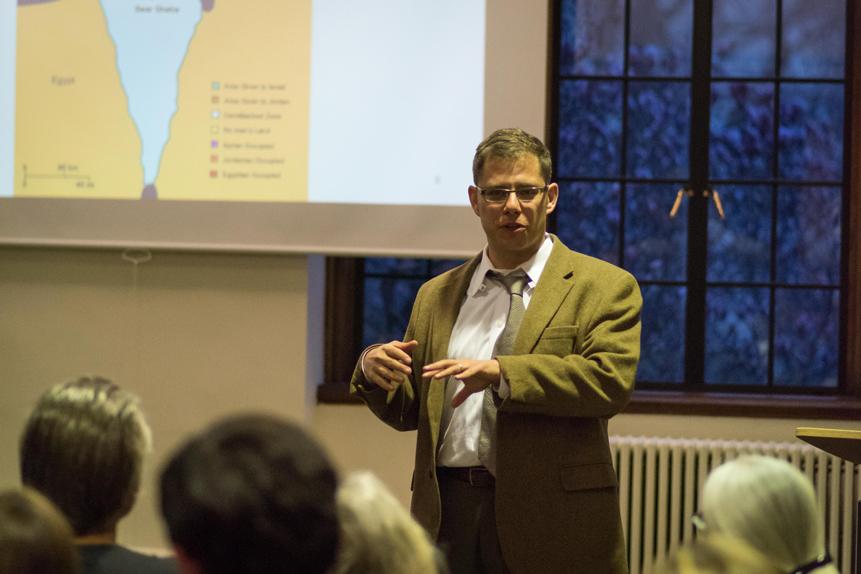Northwestern professor, students tangle on legality of Israeli settlements
Daniel Tian/The Daily Northwestern
Eugene Kontorovich speaks about the legality of Israeli settlements on Tuesday night. Kontorovich argued that the settlements are technically legal under international law.
April 15, 2015
Tensions ran high in Scott Hall on Tuesday night as Law Prof. Eugene Kontorovich discussed the legality of Israeli settlements under international law.
Kontorovich prefaced his speech by stating he was dissecting a “question of law” and he “was not going to talk about what’s good for peace … what’s fair … what God wants,” because “international law doesn’t necessarily coincide with any of those things.”
“The word settlement as an international legal term is a bit strange,” Kontorovich said, before explaining its absence from the vocabulary of international law outside the League of Nation’s 1922 Mandate for Palestine.
He went on to address arguments that Israeli occupation of Palestinian lands violated the Fourth Geneva Convention from a variety of angles, pointing to Palestine’s lack of legal entitlement to protection from the treaty and Palestine’s questionable status as a sovereign nation.
Kontorovich is also a senior fellow at the Kohelet Policy Forum in Jerusalem. Wildcats for Israel, Northwestern’s Political Union and the Alexander Hamilton Society — whose NU chapter Kontorovich helped found — co-sponsored the event.
Karna Nangia, co-president of Political Union, said the group brought Kontorovich because of students’ interest in the issue.
“It challenges the way people think,” the Weinberg junior said before the event. “That’s always a good thing even if you don’t agree with it.”
Kontorovich went on to illustrate ways in which the international community seemed to hold Israel to standards they did not hold for other countries, such as the Vietnamese occupation of Cambodia, or the United States’ own occupation of Western Germany from its creation until 1989.
Kontorovich concluded his speech by saying laws are important because “a rule which only applies in one context and doesn’t apply in 11 others… is a value judgement.”
“(It) might be legitimate, but you can’t call it international law,” he said.
When Kontorovich opened the floor up to questions, some audience members contested his points.
Tal Axelrod, co-chair of J Street U Northwestern, a pro-Israel group, said he attended the event “to push back on the notion that (settlements) are legal,” but believes “the bigger message is that settlements are an obstacle to peace.”
“This is such a complex issue that you can never be too educated,” the Medill junior said. “You can never talk about it too much.”
Weinberg senior Josh Boxerman, the outgoing chair for J Street U Northwestern, said he was concerned Kontorovich focused only on the legality of the issue, and said discussion at NU centers too much on people gathering to affirm their own viewpoints rather than engaging in legitimate exchange with each other.
“The real questions that we need to be asking about this political situation are political questions,” he said.
Kontorovich explained he believes Israel has not violated international law, saying “the most honest answer to 90 percent of international legal questions (is) it’s not clear,” because international law does not have the same legal standards as U.S. law.
Wilson Shirley, the head of NU’s chapter of the Alexander Hamilton Society said the event was important in bringing new perspectives to the debate.
“That’s really exciting when you get … people who don’t agree with each other and care about an issue to talk about the issue,” the Weinberg senior said. “I don’t think we get enough actual debate on campuses anymore.”
Email: [email protected]


